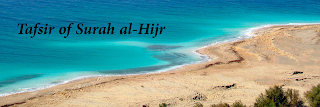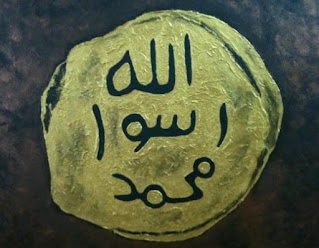Explore insightful Qur'an English translation and tafsir on our blog, offering deep reflections and authentic commentary. Access reliable Islamic translation services and enrich your knowledge through our Islamic Studies and Arabic online courses. Whether you're a student, teacher, or seeker of truth, our content supports your journey in understanding Islam. Follow for regular updates, lessons, and spiritual guidance.
Thursday, November 26, 2020
Tafsir of Surah Al-Hijr Ayah: 61-77 The Punishment of the People of Lot
Friday, November 20, 2020
Tafsir of Surah Al-Hijr Ayah: 51- 60 The Story of the Guests of Prophet Ibrahim
Tell them about the guests of Ibrahim. [Q 15: 51]
When they came to him, they said, ‘Peace be upon you.’ He said, ‘Indeed, we are afraid of you.’ [Q 15: 52]
They said, ‘Do not be afraid. We bring you good news of a knowledgeable son.’ [Q 15: 53]
He said, ‘Do you bring me good news though old age has come upon me? So what good news you are giving me!’ [Q 15: 54]
They said, ‘We have given you good news of the truth. So do not be one of the despairing.’ [Q 15: 55]
He said, ‘No one despairs of the mercy of His Lord but the misguided.’ [Q 15: 56]
He said, ‘What is the matter you have come for, O messenger?’ [Q15:57]
They said, ‘We have been sent to a sinful people, [Q 15:58]
except the family of Lot. Indeed, we will save them all, [Q15: 59]
but his wife, we have ordained that she would surely be of the doomed. [Q15: 60]
Relationship with the Previous Part
Tafsir
Tell them about the guests of Ibrahim. [Q 15: 51]
When they came to him, they said, ‘Peace be upon you.’ He said, ‘Indeed, we are afraid of you.’ [Q 15: 52]
They said, ‘Do not be afraid. We bring you good news of a knowledgeable son.’ [Q 15: 53]
He said, ‘Do you bring me good news though old age has come upon me? So what good news you are giving me!’ [Q 15: 54]
They said, ‘We have given you good news of the truth. So do not be one of the despairing.’ [Q 15: 55]
He said, ‘No one despairs of the mercy of His Lord but the misguided.’ [Q 15: 56]
He said, ‘What is the matter you have come for, O messenger?’ [Q15:57]
They said, ‘We have been sent to a sinful people, [Q 15:58]
except the family of Lot. Indeed, we will save them all, [Q15: 59]
but his wife, we have ordained that she would surely be of the doomed. [Q15: 60]
Learned Lessons From Surah al-Hijr Ayah: 51-60
Thursday, November 12, 2020
Messenger Muhammad & Humbleness
Anas, may Allah be pleased with him, reported that there was a Bedouin, whose name was, Zahir. He used to visit Messenger Muhammad salla Allah alayhi wa-sallam and bring him gifts from the desert. And Messenger Muhammad used to give him some provisions when he would leave to the desert. When Zahir was about to leave, Messenger Muhammad would say, ‘Zahir is our man from the desert and we are his supplier in the city.’ Messenger Muhammad loved Zahir, who was an ugly man. Once, Messenger Muhammad came to Zahir while he was selling his goods, and hugged him from behind that Zahir could not see him. Zahir said, ‘Release me. Who are you?’ Then he turned around and saw that the person was Messenger Muhammad. Thus, he kept pressing his back to Messenger Muhammad’s chest. Then Messenger Muhammad said, ‘Who will buy this slave?’ Zahir said, ‘O Messenger Muhammad, by Allah, you will find me unsaleable.’ Thereupon, Messenger Muhammad said, ‘But you are not valueless in Allah’s sight; rather, you are highly valued.’ [Musnand Imam Ahmed]
Friday, November 6, 2020
Tafsir of Surah Al-Hijr Ayah: 45 -50 The reward of the Righteous
The Quran’s methodology is to combine between making desirous virtuous ethics and reward and warning of vice ethics and punishment when cultivating individuals and communities. For example, when it mentions the painful torment prepared for the sinners and disbelievers, it mentions the reward prepared for the righteous and believers so that the difference becomes clear. Consequently, a person endowed with sound intellect will automatically make a comparison between the two ends, follows the path of righteousness, and avoid the path of misguidance.
Indeed, the God-fearing will be in Gardens with springs. [Q 15:45]
‘Enter them, in peace and security.’ [Q 15:46]
We shall remove whatever grudge in their hearts. They will be brothers, sitting on couches, facing one another. [Q 15: 47]
No fatigue will touch them therein, nor will they be expelled therefrom. [Q 15: 48]
Tell My slaves that I am indeed the All-Forgiving, the Most Merciful. [Q 15:49]
And that My torment is the painful torment. [Q 15: 50]
Relationship with the Previous Part
The previous part mentions the conditions of the wicked disbelievers and that their abode will be Hell. Then this part mentions the conditions of the righteous believers and that their dwelling will be Paradise.
Tafsir
Indeed, the God-fearing will be in Gardens with springs. [Q 15:45]
The righteous believers who fear Allah by complying with His commands and avoiding His prohibitions will be in Paradise in the Hereafter. They will find therein what their soul desire and they will enjoy its gardens and springs.
‘Enter them, in peace and security.’ [Q 15:46]
The ayah mentions the psychological serenity and tranquility that the righteous believers will enjoy in Paradise.
The righteous believers will be greeted when they enter Paradise. It will be said to them, ‘Enter Paradise, in peace and security. You will be saved from Hell, harm, diseases, and fear. You will enjoy peace and safety in Paradise.’
We shall remove whatever grudge in their hearts. They will be brothers, sitting on couches, facing one another. [Q 15: 47]
In Paradise, Allah, Exalted be He, will remove whatever grudge, enmity, and bitterness that the believers might have in the worldly life. They will enjoy brother-hood in Paradise and they will be sitting on couches, facing one another.
Islam does not try to change human nature in the worldly life, nor change human beings into different creatures. It acknowledges that people feel resentment toward each other in their hearts in the worldly life for one reason or another. This is a natural human disposition that belief in Allah does not eradicate. However, Islam simply tackles it so that its intensity decreases. Thus, the human disposition elevates to the horizon of love and hate only for the sake of Allah, Exalted be He. Indeed, belief in Allah is nothing but love and hate for His sake. In Paradise, the human disposition will reach a sublime rank. Whatever grudge that may be in the souls will be removed from the hearts. Only pure brother-hood exists in Paradise. Indeed, this enjoyment is for the people of Paradise. If a person finds such a feeling dominates his heart in this life, then let him look forward to be one the inhabitants of Paradise as long as he believes in Allah, Exalted be He, which is a condition without which deeds and statements are invalid [Fi Zilal al-Quran, Sayyid Qutub].
No fatigue will touch them therein, nor will they be expelled therefrom. [Q 15: 48]
The believers will not suffer from fatigue, tiredness, nor hardship in Paradise, as they will not need to labor or toil to earn their livelihoods. Their life in Paradise will be free from hardship and struggle. Moreover, the believers will remain in Paradise forever and will not be expelled therefrom, or be moved to another place.
Abu Hurayra, may Allah be pleased with him, reported that Messenger Muhammad said, ‘When the dwellers of Paradise enter it, an announcer will call, ‘You will be healthy and will never be sick. You will remain alive and will never die. You will remain youthful and will never become old. You will enjoy comfort, and will never suffer hardship.’’[Sahih Muslim]
These ayat have good news for the truthful believers. They indicate that they will enjoy permanent happy life that is free hardship, suffering, and vices in Paradise.
Tell My slaves that I am indeed the All-Forgiving, the Most Merciful. [Q 15:49]
And that My torment is the painful torment. [Q 15: 50]
Allah says, ‘O Messenger! Tell my slaves that I will forgive their sins no matter how great they may be and that I will have mercy on them. Tell them also that my torment is severe and painful. Thus, they must avoid disobeying Me. They must obey Me and perform righteous deeds so that they will attain my forgiveness and mercy and be saved from my anger and torment.’
The ayah mentions forgiveness and mercy before torment and punishment because Allah’s forgiveness and mercy come before His punishment and torment. Moreover, the ayah says, ‘My slaves.’ This indicates great honor to the believers because Allah calls them ‘My slaves.’ Indeed, the greatest honor that a human being can achieve is to be a slave to the Master of this universe, Allah.
Abu Hurayra, may Allah be pleased with him, reported that Messenger Muhammad said, ‘When Allah created mercy, He created it, containing one hundred parts. He kept ninety-nine parts with Him and assigned a part to all His creatures. Had the disbeliever known about all the mercy that Allah kept with Him, he would never despair of entering Paradise. And had the believer known about all the torment that He kept with him, he would never feel secure from entering Hell.’ [Sahih al-Bukhari]
Learned Lessons From Surah al-Hijr Ayah: 45-50
• The reward of those who fear Allah by obeying His commands and avoiding His prohibitions will be Paradise wherein they enjoy permanent happiness.
• The dwellers of Paradise will enjoy a life free from hardship, suffering, and vices.
• The mercy of Allah is vast. On the other hand, His anger and torment are severe. Therefore, a believer should always be careful, hoping for the forgiveness and mercy of Allah and fearing of His severe torment and punishment. He must obey Allah’s commands and avoid His prohibitions.
Quran, Tafsir ibn Kathir, Surah al-Hijr
Revelation and Collection of the Quran
Sunday, November 1, 2020
The Moral Character of Messenger Muhammad
Aisha, may Allah be pleased with her, said,
‘Messenger Muhammad [salla Allah alayhi wasallam] never beat anything with his hand, neither a woman nor a servant, except when fighting for Allah’s sake. And he never avenged himself on anyone except when limits prescribed by Allah are violated; thus, he revenges for Allah’s sake.’ [Sahih Muslim]




